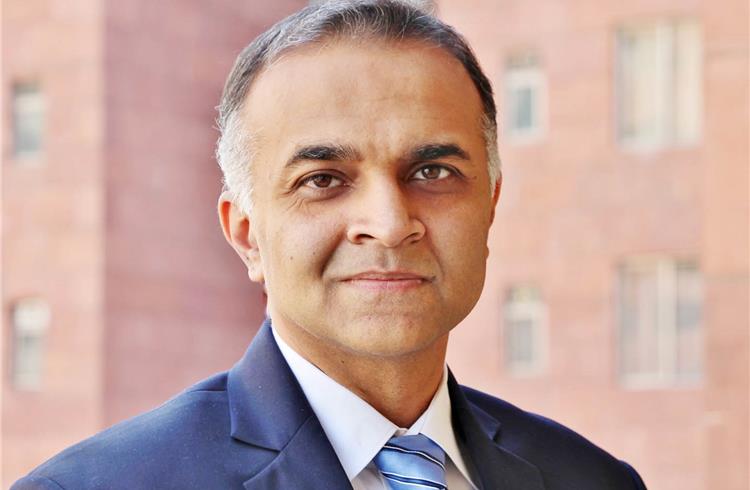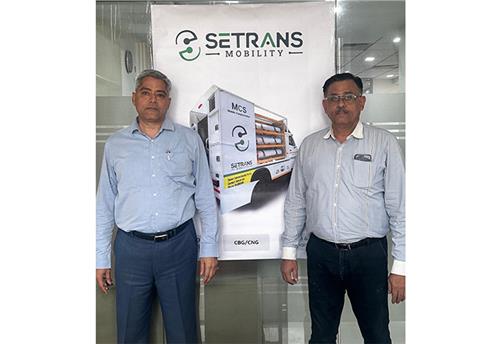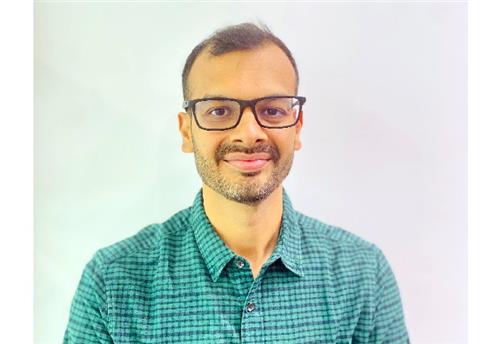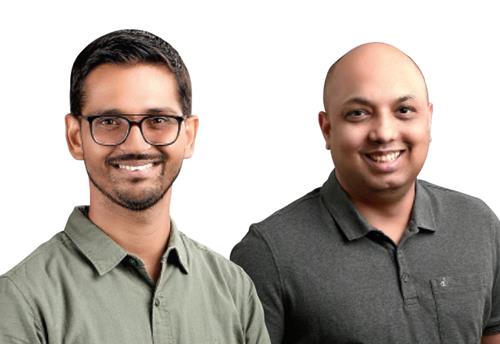Meetul Patel: 'Smarter AI, which takes into account India’s road challenges, will emerge from within the country itself and solve its mobility challenges.'
Cars today are data centres, churning out humongous information related to vehicle characteristics, driving habits and also external conditions. Microsoft India’s chief operating officer speaks to Mayank Dhingra on the company’s software platforms that can help carmakers and suppliers develop new and dynamic in-vehicle connected experiences.
Cars today are data centres, churning out humongous information related to vehicle characteristics, driving habits and also external conditions. Microsoft India’s chief operating officer Meetul Patel speaks to Mayank Dhingra on the company’s software platforms that can help carmakers and suppliers develop new and dynamic in-vehicle connected experiences.
How is Microsoft currently placed in the global connected car space?
Microsoft essentially provides technology platforms for every industry including the automotive sector, which are then used to create new solutions for their customers. We don’t necessarily create the end solution itself, but our platforms allow other people to create new solutions and come up with unique and innovative ideas.
In that context, what Microsoft has done is provide a platform for connected cars. Now, it is not just the auto manufacturers but the entire ecosystem that wants to participate in the digitisation of transportation, to use this platform and create new services and play in the vast field.
Connected cars can churn out terabytes of data every day, which includes information beamed out about the vehicle itself, road conditions, weather, traffic patterns et al. There is so much information that is possible and if one needs to take advantage of that, then all of this data needs to be collected and processed.
So, the first part of our platform for connected vehicles is our cloud, also known as the Microsoft Azure Cloud. It provides that infrastructure and the networking capabilities where data can be stored as well as be computed upon. We also provide services such as Artificial Intelligence (AI), mapping and location, and communication services like Skype. Moreover, we have created five very specific services that people can use like Lego building blocks.
One of them is telematics and predictive services like preventive maintenance. The second set includes productivity and digital life within a car – for instance Skype, entertainment services, Microsoft Office and Calendar.
The third includes advanced driver assistance systems (ADAS) services, which we are more or less familiar with; the fourth includes advanced navigation and the fifth package is all about customer lifecycle, insights and engagement, which can be used to juxtapose a customer’s tastes and preferences on to other aspects of life.
Who are your top global customers utilising the platform and the technology on offer?
We have a large number of OEMs which are utilising our platforms for building their own solution sets. These include some global giants like Renault-Nissan, and even Tata Motors from the Indian sub-continent. Ola cabs, UNO Minda and Tyre Express are some of the other examples from the local market, which are leveraging the potential of our cloud services and developing IoT-based performance management solutions.
With such humongous amounts of data going to be generated every day, doesn’t cybersecurity seem to be a big challenge in the coming future?
This is a very important point. Whenever there is this much information, we have an obligation to find ways to protect and secure it, and maintain privacy at the same time. One of the ways in which Microsoft handles it is with the Azure Sphere. Azure Sphere is a way for us to ensure that we protect data flow, right from the start point, for instance, from a sensor in the vehicle’s tyre, all the way up to the cloud. It has three major components.
First, we actually have embedded security in the hardware itself such as in the micro-controlling units (MCUs) or the sensors and the chips within the car itself. Then, there is the Azure Sphere operating system for IoT, which again manages security in the data flow. And lastly, the third part of it is what we call the Azure Sphere Security Service, which helps in authentication and to monitor threats that may be lurking somewhere in an AI-intensive world of technology.
This is where our deep experience in enterprise management proves very useful for our new customers who are coming up to use our connected vehicle platforms. We know that we have to constantly deal with security issues for our primary customers in the IT space, and so, our cloud infrastructure has all of these security mechanisms built in by default.
So, in terms of developing these services and systems, where does India stand in the overall picture on Microsoft’s global map?
We have development centres in India and our engineering teams are based out of the country. A lot of the technological development and research happens here and the beauty of the modern world, especially with the cloud, is that innovation can happen anywhere across the world and still get noticed. Our security on the cloud wasn’t primarily established for the security of connected cars, but was determined keeping in mind a billion connected computers worldwide and to save them from being broken into by hackers.
So, we see the market opportunity to be quite substantial in India. Our engineers and technologists here would always have some sort of inputs on new product development, being done for any part of the world.
The platform is very useful and we will try and make sure that we have a product for everyone in that space, including start-ups. The real magic happens when start-ups build digital services in and around the cloud. Such a service can be made in India and then exported to the rest of the world. That would really be very exciting to see.
The beauty of the modern world is that one can participate in the global auto space through technology by coding and building software, which can extract value from every car sold in the world. The future calls for fantastic services to be offered.
What would be some of the innovations that come to your mind, which could spawn in the future?
For one, India is very good at frugal engineering and in ways to manage costs. So, preventative maintenance and effective supply chain management can be just some of the areas of innovation. If a vehicle sensor tells the life of brakes, companies can plan in advance which cities would come up with the demand of such parts and can manage the inventories better. Moreover, road safety, fuel economy or battery efficiency in case of EVs, can all be substantially improved with the power of data and by learning from the user’s riding or driving patterns.
Interconnectedness also holds vast possibilities, where ride sharing is one of the leading examples, having brought tremendous ease to the way people commute worldwide. The smartphone is another phenomenal tool to be driving a number of innovative applications, including those of driver alertness, ADAS and geospatial security in the present day.
How soon do you think India is going to switch over to these new advanced driver assistance safety platforms?
India is a vast market, which is also segmented. While there is a market segment which rightfully demands the high-end ADAS solutions available globally, there is also another one which doesn’t need this, but needs just low-cost access to transportation. So, I think, we will see a whole spread. There are already some premium cars which are coming equipped with some of the most advanced self-driving aids and driver assistance systems on offer. While these might not function fully in India due to the infrastructural challenges, a lot of these assisted driving functions can still be operated on highways and expressways.
Where at one end, this segment will benefit immediately, on the other hand, we would need to drive innovations that take care of the country’s specific requirements and are cost-effective as well. Smarter AI, for instance, which takes into account India’s road challenges are some of the things which will emerge from within the country itself and solve its mobility challenges.
Is one of the bigger applications of the cloud also related to Industry 4.0?
It is all Industry 4.0 as a megatrend. When Microsoft talks about the future, it is the concept where we talk about an intelligent cloud, fuelled by a massive evolution of computing devices from sensors in a ground in a farm, to drones in the sky, to voice recognition systems in an office, to PCs. It is also fuelled by the fact that economics have dropped so substantially. A drone today costs 1 percent of what it used to some years ago; motion sensors are priced at a hundredth of what they were some 10 years ago.
So, there is so much of data connection and security available that one needs a highly powerful cloud to orchestrate and create fascinating experiences. It is with this much data, that the need for AI becomes imperative and also allows to play within the intersection
of the physical and the digital – which is actually how Industry 4.0 can be defined.
With all these connected vehicle technologies coming in, do you also see the need for re-skilling of manpower, especially in automotive?
I think every new innovation brings in disruption, just like what happened with the advent of the smartphone. Yes, there will be a need to re-skill the workforce. People adapt very quickly because technology is becoming more intuitive as well as more pervasive. Ride sharing, as a concept, has evolved tremendously just within the last couple of years and both drivers and riders have adapted to it. So, definitely, businesses will have to change in terms of how they derive value and where they make money from. It can be from various aspects – from intelligence software, proactive and physical services or by saving fuel.
So, while the providers will evolve their businesses, their capabilities will also change according to the needs to the times. On the other hand, what our proposition to manufacturers remains is that if they are good at designing and manufacturing cars, then they need not worry about offering the experience, as those can be completely taken care of by Microsoft.
Does Microsoft also aid start-ups in any way to establish their businesses?
Yes, certainly. We have a programme called ‘Microsoft Start-ups’, where our support spans from providing services at a low fee, to accessing cloud technologies. We also support a lot of incubators across educational institutions in the country and also have our own incubation centre. Moreover, we help start-ups go to market. Once their product reaches a certain point, we introduce them to our customers.
What is the fee for using the Azure Cloud platform?
It’s for free. And that’s the beauty of the cloud. This was unimaginable until a few years ago. One can access the various platforms available on the cloud – for instance a chat-bot service, computer vision, face recognition, speech recognition, analytics, data factories and virtual machines – and get started for free. One can thus start, create and develop and can only pay as they grow and need to use the more advanced features on offer. So, the scale is massive and allows for access to millions of possibilities.
In today's fast-paced world, software obsolescence is a reaility. Is there a way out?
I don’t think that can happen. I think it is human ingenuity and desire to constantly improve and create something new and always move ahead. Now we have the capacity to do even more and do it much faster. We’ll all learn to absorb and the market will define that. If one creates things too fast and the markets can’t absorb that, it simply won’t. On the other hand, if the market is more demanding and consuming, then, someone would come and fill it. But I think in general, the technology or the solutions that succeed are the ones that fulfil a desire that the market has.
What are your thoughts on the future progress of the Indian automotive industry?
I think it’s an exciting space and the automotive industry in India is going to continue to grow further, and customers are going to demand for more. There will be more demand for digital services percolating from the similar experience they have had in other parts of their lives as well. And lastly, innovations from large companies, as well start-ups are set to bring in a lot of transformations in the overall mobility space in the country.
(This interview was first published in the July 15, 2018 issue of Autocar Professional)
RELATED ARTICLES
Setrans Mobility Booster Charging top-up 25% EV range in 15 minutes
Two enterprising tech-savvy entrepreneurs Rana Roshan Singh and Vivek Ummat of Noida, Uttar Pradesh-based start-up Setra...
'Our products are proudly 100% designed and made in India'
Creatara Mobility, a New Delhi based electric two-wheeler startup, claims to have tackled various challenges in making i...
'EVs have been around for a much smaller time than ICE, so best practices are still evolving'
EV OEMs and start-ups are under pressure to reduce production costs and bring them close to ICE counterparts. Vaibhav Ku...





 07 Aug 2018
07 Aug 2018
 7329 Views
7329 Views





 Autocar Pro News Desk
Autocar Pro News Desk




